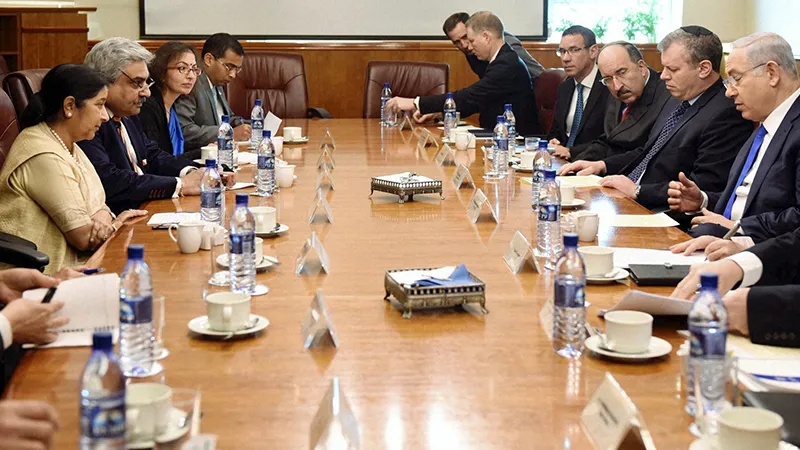External Affairs Minister Sushma Swaraj’s two-day visit to Tel Aviv and Ramallah might end New Delhi’s discomfort with itself in dealing with Israel and Palestine. But India’s past problems in the Middle East pale into insignificance in comparison to the challenges staring at Delhi today.
After Independence, India’s mental map of the Middle East had two axes. One was the conflict between the Arabs and Israelis. The other was anti-imperial solidarity. India’s simple political image of the Middle East, of course, never fully reflected the messy ground realities.
But the Indian political class would not let facts come in the way. For the
Congress, sounding pro-Arab and anti-West became a matter of political expediency. The Jana Sangh and others on the right saw India’s Middle East policy as a prisoner of minority appeasement at home.
The establishment of full diplomatic relations with Israel after the Cold War did not help move Delhi decisively towards
an interest-driven regional policy. The UPA government deepened India’s engagement with Israel in private but was not willing to be seen with its leaders in public.
The immediate instinct of Prime Minister
Narendra Modi, in contrast, was to flaunt India’s special relationship with Israel and his own personal bonhomie with Israeli Prime Minister Binyamin Netanyahu. Since then, though, the Modi government has begun to recognise that India’s interests demand an open and transparent engagement with all sides in the Middle East.
If Delhi has struggled all these years to find the balance in coping with the Arab-Israeli dispute, it must now deal with far more pressing challenges arising from the intra-Arab conflicts, the deepening sectarian faultlines and the mounting rivalry between Saudi Arabia and Iran.
India’s traditional anti-Western prism too looks outdated in understanding the region. After failed Western interventions in Iraq, Libya and Afghanistan, President
Barack Obama is refusing to drag America into a new regional quagmire in the Middle East.
After four decades of marginalisation in the Middle East, Russia is actively intervening in the region. America may still be the most important power in the Middle East. But its hegemony is being chipped away on both the supply and demand side.
There are other trends as well. Extended hostility between the US and Iran has begun to ease after the resolution of the nuclear dispute between Tehran and the international community. This has sent a chill down the spine of many Arab regimes that have long relied
on American power as the guarantor of regional security.
The normally cautious Saudi Arabia has struck out on its own. It has assembled a coalition of more than 30 countries to support its new regional activism. The contestation between Riyadh and Tehran is now the dominant reality in Syria, Iraq, Bahrain and Yemen.
The new regional dynamic is illustrated by two other visits to the Middle East this week. One is by President Xi Jinping, who is travelling this week to Saudi Arabia, Egypt and Iran, and the other is a surprising dash to Riyadh and Tehran by Pakistan Prime Minister Nawaz Sharif, accompanied by the army chief, General Raheel Sharif.
China, which has largely kept itself away from the politics of the region, is moving gingerly on a pivot to the Greater Middle East. For the region itself, China now looms large as a long-term economic and political partner. China is now the largest importer of oil from the region. Xi wants to complement it by promoting Beijing’s “one belt, one road” initiative.
China has put itself in the middle of the Afghan peace process, and stepped up its political engagement with both Iran and the Arabs. The Chinese navy has operated in the Gulf of Aden since 2008, and has begun to build a military base in Djibouti. Beijing is also likely to expand its arms sales and military assistance to the region.
If Xi’s visit comes after a steady rise in China’s profile in the region, the rare joint foreign visit by the Pakistan PM and the army chief underlines the impact of Gulf geopolitics on the subcontinent. Although Islamabad is presenting the foray as an effort to “mediate” between Saudi Arabia and Iran, it is more a tightrope walk between a neighbour and a longstanding benefactor. It is also about relieving the tension between Saudi pressure to join the war against Iran and the widespread internal opposition to it. Like Pakistan, Bangladesh, too, is under intense pressure to pay back the Saudis.
The emerging Middle East has little in common with India’s outdated perceptions of the region. Persisting with the traditional political timidity and posturing will cost India dearly. To secure India’s vast and vital interests in the Middle East and to prevent the fires there enveloping the subcontinent, Delhi needs to liberate its policy from narrow domestic political considerations, look beyond oil and diaspora, and embark on a substantive strategic engagement with the region.
This article originally appeared in
The Indian Express.
The views expressed above belong to the author(s). ORF research and analyses now available on Telegram! Click here to access our curated content — blogs, longforms and interviews.




 PREV
PREV

